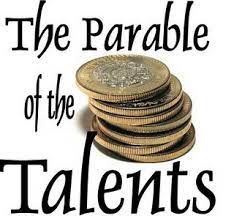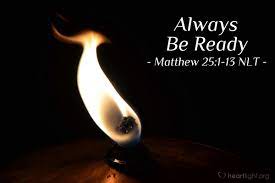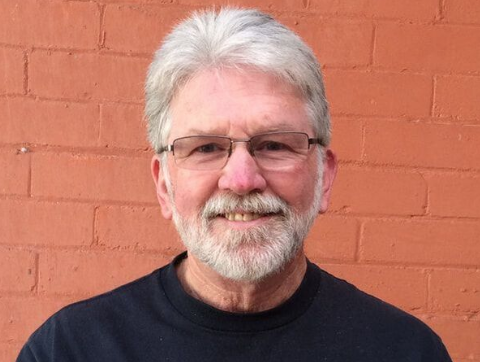Reflection: "Love Draws Near" In the last few weeks, we’ve looked at the parables of the 10 bridesmaids and of the 3 servants with talents.This week we’re looking at a story featuring the King who comes to us, draws near and shows us how to offer practical love to the needy folk around us. One of the privileges of being a Pastor is that I get to go to a lot of funerals. It’s an honour and a pleasure to assist the family in giving thanks for the life of the loved one whom they have lost. It means that I get to hear a lot of people speaking about what they thought was important in the life of the person who died. It probably won’t surprise you that the tribute payers never speak about how much money the person made, how flashy their house was, or how many possessions they had accumulated. Instead, it’s almost exclusively about relationships – especially about their relationships with family, and whether they have been able to do some good for others in the world. That’s how our loved ones will sum up our life at its end. In today’s parable, Jesus raises the question of how God will judge our life at its conclusion, and guess what, God also looks at our lives in terms of relationships. God dearly wants to be in a loving relationship with us and Jesus says the way God knows we are responding to his love is to look at how we pass on that love to others. You can’t repay God’s grace – you can only pay it forward.Jesus says that God especially wants to know whether, like him, we are trying to love the imperfect, the struggling, the ones no one else seems to love – the poor, the hungry, the prisoners, etc. It’s a tough task. I imagine that if Jesus came into our church on Sunday morning and asked for the sheep to be on one side and the goats on the other, most of us would be standing in the centre aisle. Yes, we’ve tried to love and care for the poor, the hungry or the refugees, but we’ve also had plenty of selfish and self-centred moments.We need to remember just who is telling this story – Jesus, the one who shows us that God loves us despite our failures, not because of our good deeds. The more we open ourselves to that grace, the more we can pass on that grace to those who need it most. I know it’s tragic, but I’m a fan of the book and TV show The Hitchhikers' Guide to the Galaxy, by the late Douglas Adams. For those who haven’t come across it yet, it’s a comic science fiction novel about the end of the world, other intelligent life in the universe, and ultimate answers. One of the chapters in the book actually provides, thanks to the universe's most powerful computer, called Deep Thought, the “Answer to The Ultimate Question of Life, the Universe, and Everything”.After seven and a half million years of calculation, Deep Thought reveals that the answer is 42.And then, to those baffled folks wondering what they can possibly do with that answer, Deep Thought suggests that maybe the problem is that they've never really thought through what the ultimate question actually is. So, when we come to this climactic passage from the latter part of the Gospel of Matthew, should the question be “how do we gain everlasting life, or go to Heaven, when we die?”Or should it be “what are we supposed to be doing right now?”When we're seeking Ultimate Answers, how we understand the question matters quite a bit. In our gospel lesson today, Jesus is seen separating sheep and goats and is described as a king on his throne, rewarding his subjects according to their adherence to his great ethical commandment of compassion. The passage comes in the last great teaching discourse in Matthew, a long section about the end of the world and the time of completion, it follows numerous parables about being ready for whatever is coming, whenever it gets here. A thief in the night. A slave and a master. Foolish bridesmaids who are unprepared. Slaves given trust over things while the master is away. Apocalyptic stories about judgment and being prepared. So what IS the question?
Is this passage about believing in God, so that you’ll go to Heaven when you die? The Bible's central message is not about believing in God so that you’ll go to Heaven when you die.In fact, in Matthew’s Gospel, belief, in and of itself, is not sufficient for the disciples of Jesus.At the end of the Sermon on the Mount, Jesus laments that many people will call him Lord, but only those who act upon his ethical teachings can be his true followers.And in the Great Commission, Jesus doesn't ask them to form disciples who believe that he is the Messiah, instead, he says “teach them to observe every ethical teaching I have commanded of you.” If you think the question is “am I going to Heaven?”, “will I be saved?”, or “am I a sheep or a goat?”, then Matthew suggests you’ve missed the point. What you're seeking, is not actually pie in the sky, but, as Archbishop Desmond Tutu says, “pie in the here and now”.A jolt from a spiritual cattle prod - that will help you struggle up the path that awaits you this week, month, year. So maybe the question we should ask is not what happens at the end of things, but more like what am I supposed to be doing right now? What does Jesus want me to do? To be?How will my life be different if Christ is King and his love draws near to me? The conflict over who is Lord, is acted out in our lives today and every day.The world still wants us to worship all that is “not-God”, and our culture even rewards us when we do. But this conflict between the two Kingdoms, one of this world and one of the divine realm, becomes clearly delineated in the life of Christ. Jesus tells us that the usual things people elevate as gods – like power, wealth, celebrity and fame - are replaced in the Kingdom of God by the supreme values of service, love, self-sacrifice - and faithful community. Life in God's Kingdom is not about self-aggrandisement, but about self-denial. It's not about big words, it's about powerful actions. Life in God's Kingdom is not about what you have, or who you are, it's about what you do.It's not about what the world values, but what God values. Some years ago, I was asking God to let me know what he wanted me to do with my life. I prayed hard, asked often, and the result, was this: a friend got up at church and talked about a new ministry he was involved in, called the Kairos prison ministry. I realised immediately that this was right for me. The main bible verse they use is one that is in today’s Gospel - Matthew 25:36 “I was in prison and you visited me”. So, instead of listening to the world, which says "believe in me, and act like a goat", the message should be this: “if you love God, if your values are God-values instead of the world's values, if Christ actually is your King, then you will love as God loves, give as God gives, forgive as God forgives.If your values are God-values, you can't help but live as Christ taught.” So how are things going to end? What happens after we die? I don't know - and I suspect that you don’t, either. But we do know the shape of the story a loving God is writing for us:Christ is King and we know that Jesus will be waiting for us at the end of our story, that he will see us and know us and that if we’ve done what he taught us, he’ll claim us as his own.His love will draw very near to us. And, I have to say, that question and that answer are enough for me. Pastor Rick
1 Comment
Reflection: "Risky Business"Our God is right into taking risks - that’s obvious, isn’t it?
Otherwise, we human beings, imperfect creatures as we are, wouldn’t have been left in charge of this planet. This strategy, the degree of free will that God has permitted us, is a high-risk undertaking. It means that God is prepared to even hold back on applying his divine power, so that we might have such freedom. And that’s really quite a dicey decision. God chose to live dangerously in order to open the opportunity for his “many children on earth to come into glory”. In dark contrast, the temptation for believers to “play it safe” may be one the smartest items in Satan’s box of tricks. Today’s Gospel reading features the parable of the talents. Jesus tells us that the kingdom of heaven: “is like a man going abroad, who called his servants and trusted all his capital into their hands. To one he gave five talents, to another two talents, and to one he gave one talent. To each, according to his ability.” Over many generations, preaching and teaching has focussed on how well Christians used the gifts God gave them. It’s stressed our need for good stewardship. The amounts of money that were mentioned - 5 talents, 2 talents and 1 talent, have been likened to our special abilities, thus the meaning of the word “talent” changed; no longer does it mean just a unit of currency, but it now includes the special gifts we have been given by God. The value of a talent depended on where you grew up. For the Greeks, a talent weighed about 25 kilograms of silver or gold. But for the Jews, it was about 50 kilograms of either silver or gold. The point is that it was a large sum of money, so let’s not feel sorry for the servant who was given only 1 talent. Okay, the others got more to manage, but even one talent was a huge amount of money. In silver, it would be the equivalent of 15 years of wages for a labourer and in gold, it would be a small fortune. What the master did, before he went away, was to entrust them to trade with these large sums of money, and to try making a handsome profit for him. He didn’t specify whether they should utilise wine, oil, grain, textiles, pottery, land, shipping, or whatever. He just took a big risk and allowed them to make their own decisions. I guess he expected them to take a similar risk. They were to put what was entrusted to them to good use. Trade and commerce, like human life itself, can be a precarious business. There’s always the possibility of setbacks and even losses. Witness the fact that in Australia, over 40% of small business ventures fail within the first two years. Trading is high risk, but the master knows all about that; he understands, and he wants them to give it their best. Let’s recognise the key element in this parable: the Lord truly places the responsibility in the hands of his servants. This is not make-believe stuff - he was serious. He doesn’t even stay in the background, like a back-seat driver, tut-tutting when things aren’t going well. Nor is he akin to a driving instructor, with calm nerves, yet with a separate brake pedal for him to employ in an emergency situation. No, the Lord in the Gospel fully trusts his servants. He leaves his country and travels abroad, so it’s now entirely up to them whether they succeed or fail. A high-risk strategy indeed! The first two servants honour the trust placed in them by taking some risks and put the money to use. Their talents became highly productive in the commerce of this life. Both of them make a 100% return while the Master is absent overseas, so these two receive the Master’s gratitude. Well done, good and trustworthy servant. You have proved yourself in a small way, now I will entrust you with something bigger. Come here and enjoy your master’s delight. Note this: those who are faithful receive a two-pronged reward. 1) Immediately there is the sheer joy of celebrating in the Master’s presence and: 2) Then comes more trust and responsibility. Those who do well for Christ Jesus are not given a “golden handshake” and allowed to sit back and do nothing. This idea of extra trust is a sobering thought for us, isn’t it! In the many generations since Jesus told this parable, among Christians there has always been a tension between those who want to play things safe and those who are prepared to take a risk in the name of their Master. That’s true in the way we either hoard or share the Gospel story with the world. Some opt for exclusive religion, like the Brethren, who keep to themselves and don’t interact with the world. They turn in on themselves, maintaining a tight knit fellowship, using their talents for each other, yet never risking them in the evil world outside their community. In contrast, some other churches and individuals are more of the risk taker kind. These groups quote Jesus when he said: “Go into all the world and make disciples of all men.” Such Christians take risks which can sometimes relate too closely with the world and its secular values. At the present time in the Uniting Church In Australia there are some who feel keenly that in social justice matters we have taken some large, and even foolish, risks, which may have been gravely influenced by the outside world. But only God can judge whether our church has exceeded acceptable risks or not. So - playing it safe, or talking the risk? Well, for my part, I’d always prefer to take the calculated risk for Christ’s sake. Better that than becoming constricted like that one talent bloke who went and buried his master’s treasure. He’s the big disaster in this story. We have no commission from the Lord to be foolhardy in the way we use our lives and our gifts, or in the way we employ the treasure of the Gospel, so I encourage you to risk it - for God’s sake - don’t be afraid. I guess none of us can look back over the years of our Christian experience and be completely satisfied with how much we have achieved and many of us have some regrets. But fear certainly isn’t an appropriate strategy. It was the over-cautious servant who was the one who was afraid - and look where it got him! Our stewardship of the gifts God has given us and those calculated risks we take in utilising our talents, should never be exercised under the shadow of fear. Ours is a God of perfect love, who is always on our side - perfect love - no room for fear. The God who is love is a risk taker and we’re called to be like him - for loving is always a risk. Yet it leads to the greatest bonus of all: “Come and enjoy your Master’s delight.” Think hard about the talents that God entrusted you with. Are you taking risks in utilising them, and multiplying their impacts, on the people you meet in your daily lives. We need to be showing them how God’s love has impacted our lives and sharing the good news with them – that they, too, can share with us in God’s kingdom. It’s not only the money God has graciously allowed us to accumulate, but the abilities we have. Instead of locking them away and keeping them just for ourselves, let’s get out there and put them to use, furthering the Kingdom of God here on earth. Pastor Rick Reflection: |
Pastor
|
LANE COVE
|
Worship Service:9:30am Sunday
© Lane Cove Uniting Church | 2020
|





 RSS Feed
RSS Feed